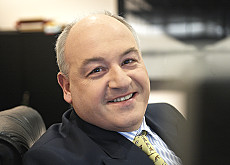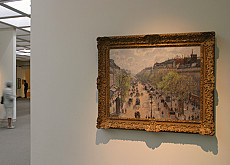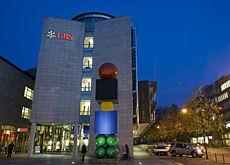Banking on the growth of the art market

Karl Schweizer, head of Art Banking at UBS, tells swissinfo about the growing importance of his unit within wealth management.
UBS is the main sponsor of Art Basel, the world’s leading modern and contemporary art fair, which opens on Wednesday.
The art market underwent a huge boom last year – it is estimated to have grown by 25 per cent – and the boom is expected to continue.
In May sales at Christie’s and Sotheby’s auction houses almost doubled compared with the same period in 2006. Figures for Art Basel remain top secret, but they too are said to be better than ever.
The popularity of art has encouraged banks to get involved. Since 1998 Switzerland’s largest bank has been offering art-related services to its customers, with the aim of making sure they avoid the pitfalls associated with the art market and art trafficking.
swissinfo: UBS was one of the first banks to marry art with finance. Are they not strange bedfellows?
Karl Schweizer: No, we realised that we had to create a banking standard in a world that lacked transparency and organisation. We don’t offer investment advice but services to an art-loving clientele. This is mostly in buying, selling and background checks, as well as transport and insurance issues.
Our aim is to offer objective, neutral and independent advice. Demand is growing because our clients don’t have a lot of confidence in the art world, a minefield of too many conflicting interests.
swissinfo: The art market, with an estimated $30 billion (SFr37 billion) global turnover, is becoming increasingly important.
K.S.: It is growing strongly, but no one can guarantee that it will continue in that way…
During my career I have witnessed two market slowdowns, and each time, stock market trends had an immediate impact on art sales. Currently it’s a buyers’ market. They indicate the prices they are prepared to pay and this goes on to influence transactions and therefore prices.
This means that during stock market crises, sellers often have to lower their prices, but as the show has to go on, they don’t admit to it. The art market is a world of rumours where no one admits to failure.
It is therefore impossible to predict how prices for art works will develop. To do it would be pure speculation.
swissinfo: How would you explain the current fascination for art?
K.S.: At the moment there are around nine million millionaires worldwide, spread over the regions which have experienced the biggest increase in wealth – Europe including Russia, Asia and the United States.
In Europe [the fascination] comes from its cultural tradition and economic growth. It’s particularly spectacular in the US because its cultural tradition is only around 250 years old and art plays an increasing role in social integration. Lots of young people want to enter this world and are ready to pay incredible sums.
It’s far more complicated in Asia, especially China. There is, of course, a strong wealth creation, but also blending of interest in both traditional and western cultures. For example, current Chinese art production is obviously mostly destined for the West.
swissinfo: It seems that the involvement of auction houses in contemporary art and living artists has pushed museums and galleries to the sidelines.
K.S.: That’s the wrong impression. In financial terms, public auction houses have a turnover of $8 billion in a global market worth $30-35 billion. This is only one part of the pie. The private market is enormous. It’s the auctioneers who make the most publicity from these million-dollar sales. They want you to believe that this is normal, but it’s not.
On the other hand, it’s true that the boundary which used to separate the activities of auctioneers from those of the galleries has become more blurred, because the two are increasingly tending to do business together.
As for museums, I’d say they are still the keepers of the flame because they define what is quality. Art history is after all a science which has always in the past allowed quality to develop through innovation.
swissinfo: And what about you – are you an art lover or first and foremost a banker?
K.S.: Originally I was a banker and lawyer. But during my career I’ve been able to learn a lot about art. Since I’ve been in this job, I’ve been able to combine it all – although many of the issues I deal with are not directly linked to art, but are technical questions concerning transactions or legislation.
I started off collecting photographs. I have now stopped and am more interested in the fine arts of the second half of the 20th century and Chinese antiquities.
swissinfo-interview: Isabelle Eichenberger
UBS estimates that the global art market in 2006 was worth $30-35 billion and the public art sales market is worth $8 billion.
80% of works sold at auction are under the $11,000 mark.
A lawyer by trade, Schweizer moved into finance, working at several banks.
When UBS was created in 1998, he was chosen to head the Art Banking division.
He is a collector himself. He started with photographs and now concentrates on recent artworks and Chinese antiquities.
The UBS Art Collection is a very important collection of contemporary art. It includes more than 900 paintings, photographs, drawings and sculptures from the 1950s to the present day.
UBS sponsors Art Basel and Art Basel Miami.
UBS Art Banking coordinates and organises art events. It offers services to the bank’s clients such as identifying and researching market opportunities for buying and selling artworks and working out investment strategies. It also helps with transport and insurance matters.
UBS was voted Best Art Banking in the World 2007 by Euromoney magazine.
UBS employs 80,000 people in 50 countries and is Switzerland’s largest bank as well as the world’s leading wealth management company.

In compliance with the JTI standards
More: SWI swissinfo.ch certified by the Journalism Trust Initiative


You can find an overview of ongoing debates with our journalists here. Please join us!
If you want to start a conversation about a topic raised in this article or want to report factual errors, email us at english@swissinfo.ch.